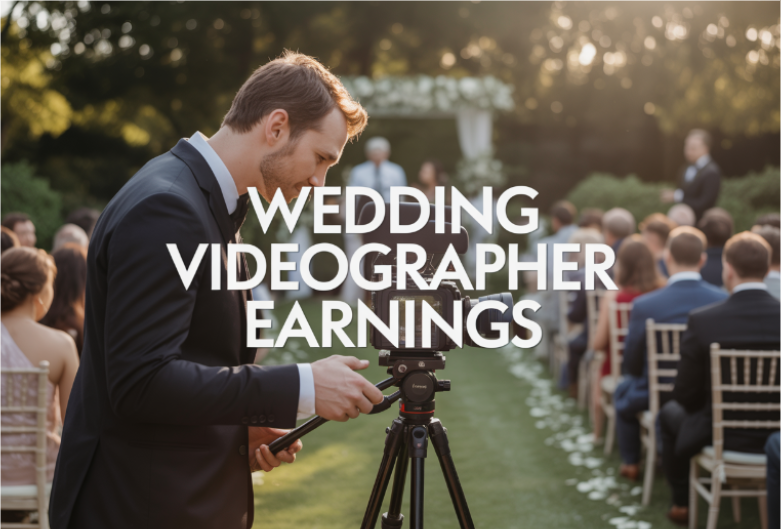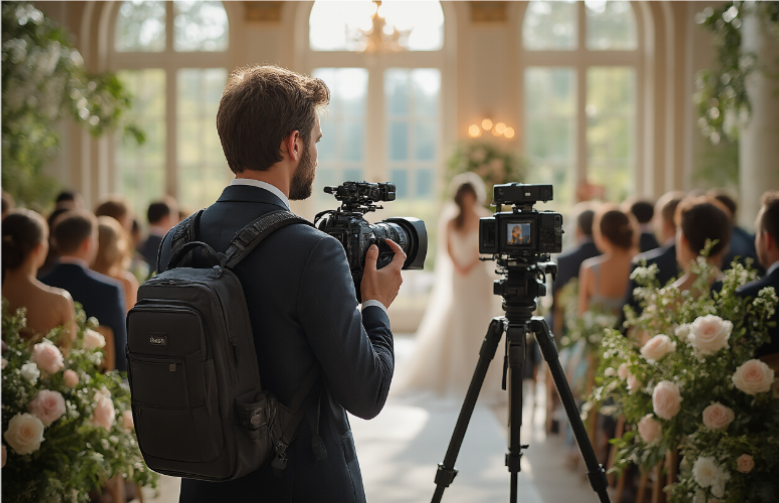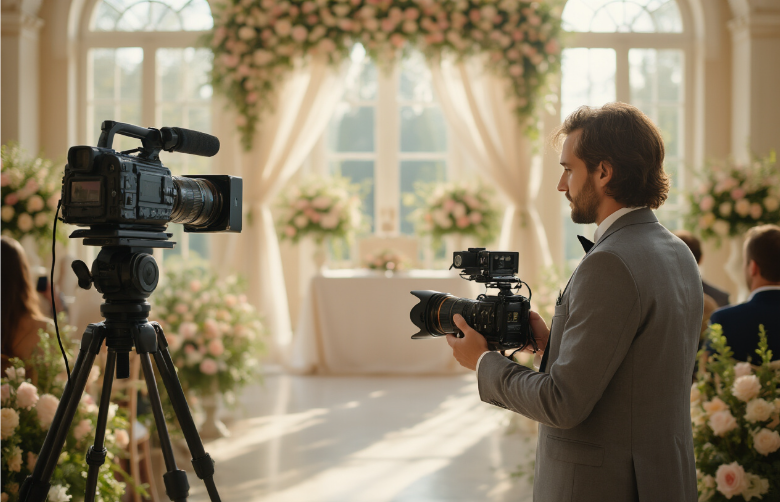How much does a cameraman make at a wedding?
Summary
Wedding videographers earn between $500 and $5,000+ per wedding, depending on their experience, location, and service quality. This guide breaks down income ranges, pricing factors, and extra revenue opportunities like engagement shoots or corporate videos.
Platforms like MediaZilla help filmmakers streamline client delivery, enhance presentation, and monetize extra footage, making every project more profitable and professional.
Introduction
Wedding videographers typically earn $500–$5,000+ per wedding, depending on experience, location, and services offered. This guide explains how much cameramen make at different experience levels and markets, what factors influence rates, and the payment models they use. It also covers extra income streams like highlight reels, engagement sessions, and corporate work that help boost total earnings.
Entry-level Cameraman Earnings
Starting wedding videographers typically earn between $300 and $800 per wedding, depending on their location and the services they provide. Many newcomers begin by offering basic ceremony coverage with minimal editing, which allows them to build their portfolio while charging competitive rates. Some entry-level professionals work as second shooters or assistants for established videographers, earning $150-$400 per event while learning the ropes.
The learning curve can be steep, but dedicated beginners often book 15-30 weddings in their first year. This translates to annual earnings of roughly $8,000-$20,000 for part-time work. Those who commit full-time and aggressively market their services can potentially double these numbers by their second year.
Experienced Professional Rates
Wedding videographers with 3-7 years of experience command significantly higher fees, typically charging $1,500-$4,000 per wedding. These professionals have refined their shooting techniques, developed efficient editing workflows, and built strong client relationships that generate referrals.
Mid-tier videographers often offer comprehensive packages including multiple camera angles, drone footage, highlight reels, and full ceremony edits. Their established reputation allows them to be selective with clients and maintain consistent pricing. Annual income for busy professionals in this category ranges from $50,000 to $120,000, with many booking 40-70 weddings per season.
Premium Wedding Videographer Income
Top-tier wedding videographers earn $5,000-$15,000+ per wedding, serving high-end clients who prioritize cinematic quality and luxury service. These professionals often have distinctive artistic styles, premium equipment, and extensive portfolios featuring celebrity or destination weddings.
Elite videographers typically limit themselves to 20-40 weddings annually to maintain quality and exclusivity. Their annual earnings can reach $200,000-$500,000, especially when factoring in additional services like engagement sessions, bridal portraits, and corporate work.
Regional Salary Variations
Wedding videographer earnings vary dramatically by location:
Metropolitan areas like New York, Los Angeles, and San Francisco support the highest rates due to higher living costs and affluent clientele. Conversely, rural markets often have limited demand and lower average wedding budgets, though competition may also be reduced.
Years of Experience and Skill Level
- Experience and skill level heavily impact a wedding videographer’s income.
- Beginners (0–2 yrs): Earn around $500–$1,500 per wedding while building portfolios.
- Mid-level (2–5 yrs): Charge $1,500–$4,000, offering consistent quality and style.
- Experienced (5+ yrs): Command $4,000–$10,000+, delivering cinematic storytelling with advanced shooting and editing skills.
- High-level expertise in techniques, color grading, and storytelling allows videographers to charge premium rates.
Geographic Location and Market Demand
- A wedding videographer’s income largely depends on location and market demand.
- Major cities (NYC, LA, SF): $5,000–$15,000 for premium packages due to higher budgets.
- Mid-sized cities: $2,000–$6,000 with balanced demand and cost.
- Rural areas: $800–$3,000 but with lower expenses and less competition.
- Earnings also vary based on market saturation and regional traditions — fewer competitors and strong local demand allow higher pricing.
Wedding Budget and Client Expectations
- A couple’s wedding budget and expectations directly affect how much they pay for videography.
- Videography usually makes up 8–15% of the total wedding budget.
- Basic coverage: $1,000–$2,500 for simple shoots.
- Cinematic films: $4,000–$10,000+ for drone shots, multiple cameras, and detailed edits.
- Luxury venues and social-media-driven demands raise expectations, while customized packages help videographers serve different budgets and maximize income.
Hourly Rate Compensation Models
Wedding videographers working on hourly rates typically charge between $75 and $300 per hour, depending on their experience and market location. This payment structure works well for couples who want specific coverage times or have budget constraints. Most professionals require a minimum booking of 4-6 hours to make the job worthwhile.
Typical hourly rate ranges:
- Entry-level videographers typically earn $75–$125/hour.
- Experienced professionals charge between $150–$250/hour.
- Premium specialists command $275–$400/hour.
- Rates vary depending on experience, demand, and project complexity.
Flat Fee Package Pricing
Package pricing dominates the wedding videography market because it simplifies budgeting for both parties. These packages bundle specific deliverables like highlight reels, ceremony footage, and reception coverage into one price point.
Basic packages start around $1,500 and include essential coverage with a short highlight video. Mid-tier packages ($3,000-$6,000) often add multiple camera angles, drone footage, and longer edited videos. Premium packages can reach $10,000+ with same-day edits, multiple videographers, and cinematic production value.
Smart videographers create tiered packages that encourage upselling. They might offer three options: Essential ($2,500), Signature ($4,500), and Luxury ($7,500), with each tier adding more value and coverage time.
Per-Event Payment Arrangements
Some videographers prefer per-event pricing, treating each wedding as a complete project regardless of hours spent. This approach works particularly well for destination weddings or multi-day celebrations where traditional hourly billing becomes complicated.
Per-event rates typically range from $2,000 to $8,000, factoring in preparation time, shooting, and editing delivery This model protects videographers from scope creep while giving couples predictable costs. Popular with established professionals who can accurately estimate their time investment.
Revenue Sharing with Wedding Planners
Collaborative revenue sharing creates win-win partnerships between videographers and wedding planners. Planners receive 10-20% commissions for successful referrals, while videographers gain access to the planner's client base and credibility.
Some videographers offer exclusive partnerships where they become the planner's preferred vendor in exchange for guaranteed bookings and higher commission rates. These arrangements work best when both parties maintain similar quality standards and target markets.
Common Revenue Sharing Models
- Flat referral fees: $200–$500 per booking
- Percentage commissions: 10–15% of total contract
- Tiered bonuses: Higher percentages for multiple referrals
Engagement Session Bookings
Engagement sessions are a profitable add-on for wedding videographers.
They usually last 1–2 hours and earn $300–$800, helping couples get comfortable before the wedding.
Bundling engagement sessions with wedding packages increases total booking value and provides romantic, shareable content with minimal setup and high profit margins.
Corporate Event Videography
Corporate videography lets wedding filmmakers earn year-round income using the same skills and equipment.
Companies pay $150–$500 per hour or $1,500–$3,000 per day for events like conferences, product launches, and interviews.
Building ties with event planners and marketing agencies ensures recurring projects and steady income between wedding seasons.
Wedding Highlight Reel Upsells
Wedding highlight reels and add-ons offer great upselling opportunities.
Social media reels add $200–$500, raw footage sales bring $300–$800, and same-day edits can earn $500–$1,200.
Tiered packages with short, extended, and full versions let couples choose their coverage level while maximizing per-client income with minimal extra work.
Advanced camera equipment expertise
Mastering advanced camera and audio equipment helps videographers charge premium rates. Using high-end cameras like the Sony FX6, Canon C70, or RED Komodo attracts luxury clients.
Skills in drone operation, stabilizers (gimbals, steadicams), and professional audio setup ensure cinematic visuals and crystal-clear sound, raising your value by 30–50% or more.
Professional editing and post-production abilities
Strong editing and post-production skills greatly increase a videographer’s earning potential. Mastering tools like DaVinci Resolve, Premiere Pro, and Final Cut Pro ensures high-quality cinematic results.
Expertise in color grading, audio mixing, motion graphics, and efficient workflows helps deliver premium films faster, allowing higher pricing and more satisfied clients. For a professional videographer, flawless editing must be matched with flawless delivery.
Client communication and business management skills
Strong communication and business management skills help videographers attract premium clients and repeat bookings.
Success comes from clear consultations, solid contracts, and smart negotiation. Expertise in social media marketing, customer service, and project coordination builds trust, boosts referrals, and supports higher pricing.
Creative storytelling techniques
Creative storytelling and cinematic techniques set top wedding videographers apart. Skills like composition, natural audio capture, emotional pacing, and music editing turn weddings into movie-like love stories.
Videographers who blend artistry with problem-solving and adaptability build strong reputations, leading to premium bookings and loyal referrals.
Portfolio Development Strategies
A strong portfolio is key to attracting high-paying wedding clients. Focus on quality over quantity — a few cinematic, well-edited films showcase your skills better than many average ones.
Include diverse styles and venues, offer discounted shoots early on, and update your reel regularly with short social clips and full showcases to impress different audiences.
Networking with Wedding Industry Professionals
Networking with wedding industry professionals helps videographers get consistent referrals and collaborations. Build strong connections with planners, photographers, florists, and venues through meetups and bridal shows.
Partner with photographers for joint marketing, maintain good ties with venues, and earn a place on planners’ preferred vendor lists by showing professionalism and reliability.
Marketing and Social Media Presence
A strong social media and marketing presence helps wedding videographers attract more clients. Use Instagram, TikTok, and Google My Business to showcase work and reach local couples.
Maintain a professional website, post consistently, use smart hashtags, and run targeted ads to grow visibility and bookings.
Wedding videographers can earn anywhere from $500 to $5,000+ per event, depending on their experience, location, and the services they offer. Your earning potential really comes down to the skills you bring to the table, how you structure your packages, and your ability to build strong relationships with clients and other wedding vendors. The most successful videographers don't just show up and shoot they create cinematic experiences that couples treasure forever.
If you're thinking about breaking into wedding videography, start by developing your technical skills and building a solid portfolio. Consider different ways to get paid, whether that's per-event rates, hourly fees, or comprehensive packages that include engagement shoots and editing. Don't forget about the extra income streams like destination weddings, corporate events, or selling stock footage. The wedding industry always needs talented videographers who can capture those once-in-a-lifetime moments, so if you're passionate about storytelling and have an eye for detail, this could be a rewarding career path for you.







